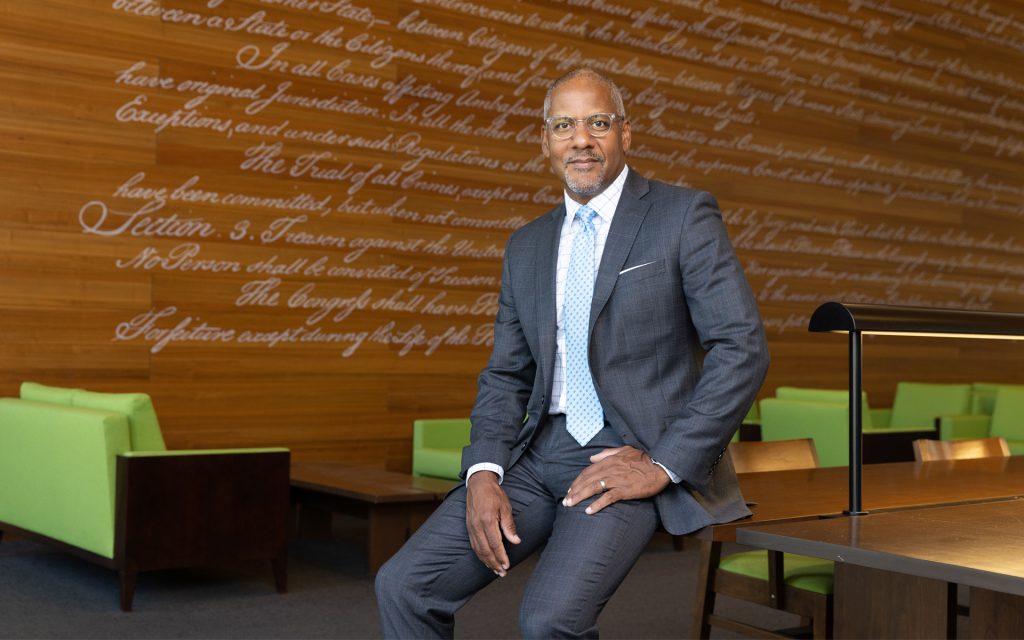
When Craig Boise went to law school in the 1980s, there wasn’t much talk of a value proposition. He received a rigorous legal education at the University of Chicago and, of course, intensive study. Still, says Boise, “There was a real disconnect between the doctrine we were learning and how to use it. We had large stacks of books and no real sense of how it all would apply in practice. That’s the gulf I’ve tried hard to span.”
When he became Dean of the College of Law in 2016, Boise was determined to redefine the value proposition of law school. “We are focused on ensuring our students attain the kinds of jobs they dream about. Certainly, they receive an excellent education, but they also get the support they need to pass the bar, the connections to externships and the clinical work that positions them to excel when they graduate. Law school is an investment. We make it worth their while.”
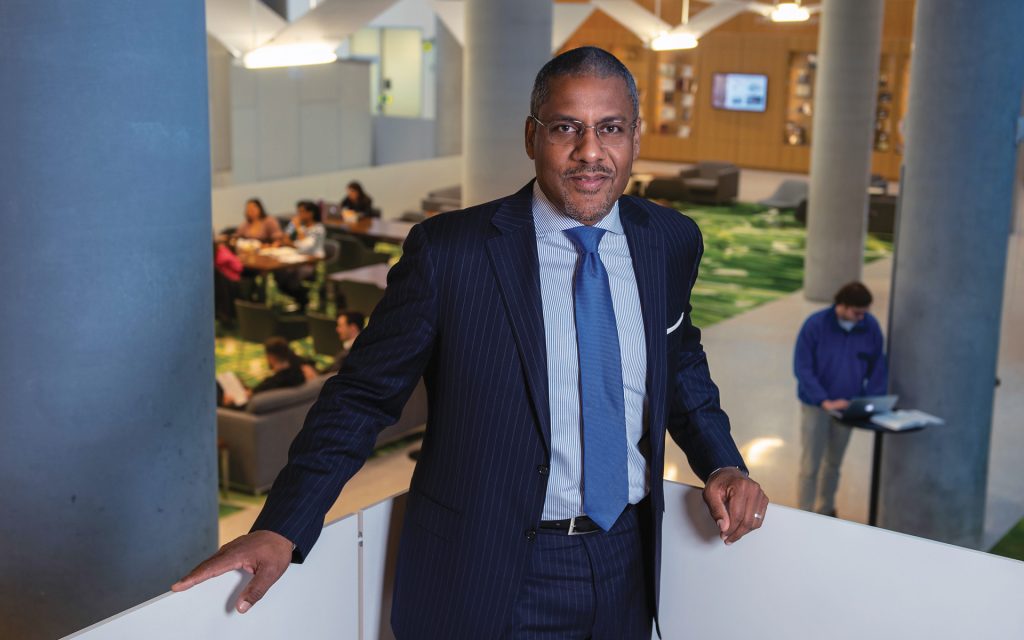
Those who worked closely with Boise during his tenure as Dean—as advisors, colleagues, faculty and staff—and students who obtained their law degrees over the last eight years say they have reaped the benefits of his vision and determination.
“During my first trial assignment, one of the senior attorneys said to me ‘I had no idea you were so well trained.’ I didn’t have to be taught how to do a direct exam or develop a strategy for cross-examination. The core was all there and it shocked some of my colleagues. I can hold my ground because of the training I received at Syracuse University College of Law.”
Tyler Jefferies L’21, Deputy Attorney General, Pennsylvania Office of Attorney General
Tyler Jefferies L’21 is testimony to the value proposition Boise envisioned. Now Deputy Attorney General at the Pennsylvania Office of Attorney General, Jefferies says she’s the youngest in the office by far. “During my first trial assignment, one of the senior attorneys said to me ‘I had no idea you were so well trained.’ I didn’t have to be taught how to do a direct exam or develop a strategy for cross-examination. The core was all there and it shocked some of my colleagues. I can hold my ground because of the training I received at Syracuse University College of Law.”
Jefferies’ advocacy skills were honed through the many trial competitions and advocacy classes that bring distinction to the College. “I consider us an elite program,” says Professor Todd Berger, Director of Advocacy Programs. “We do things that are more creative and more innovative than any other law school in the advocacy space.” Berger credits Boise for targeting areas of distinction, such as advocacy, and providing the resources to expand and strengthen those programs.
“Dean Boise never turned down a new idea to innovate,” says Jefferies. “When Professor Berger proposed the idea of a 14-week competition that operates like professional sports playoffs, the Dean said ‘Great. Let’s hammer out the logistics and just try it!’ We have been a trailblazer in the competition world and other schools are trying to do similar things. Dean Boise’s ability to see the bigger picture and support it was really important to the growth of the program.”
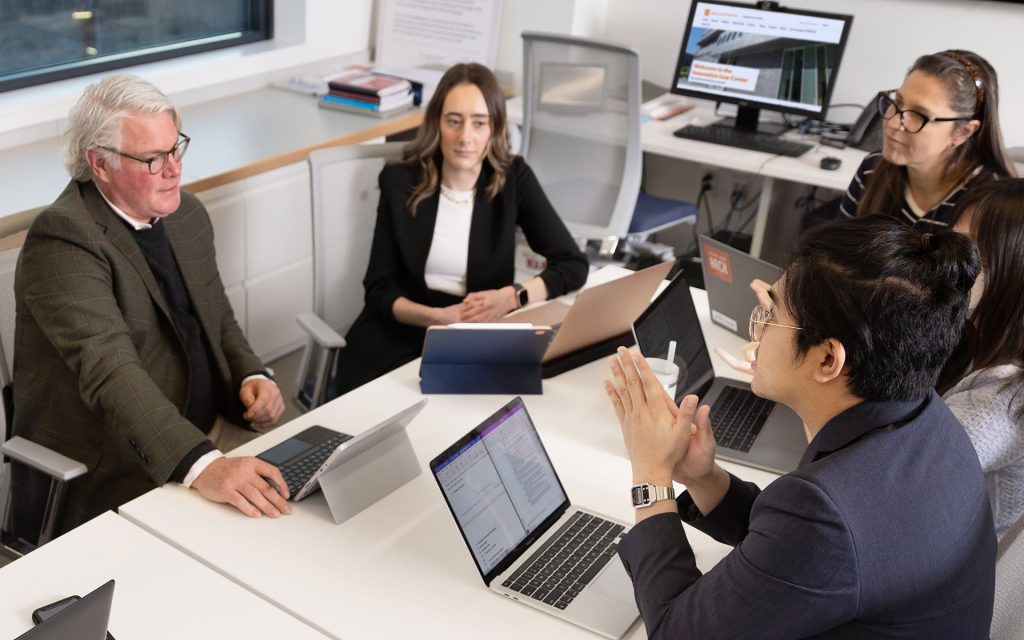
“Craig had a forward-thinking attitude toward growing the law school and providing students with the most well-rounded education possible and practical learning experiences and opportunities to make them more marketable and more successful graduates.”
Brian Gerling L’99, Executive Director of the Innovation Law Center
Trailblazer and innovator are words often used to describe Boise. “Craig had a forward-thinking attitude toward growing the law school and providing students with the most well-rounded education possible and practical learning experiences and opportunities to make them more marketable and more successful graduates,” says Brian Gerling L’99, Professor of Practice and Executive Director of the Innovation Law Center (ILC). Today, more than 97% of graduates are employed or enrolled in another graduate program within 10 months of graduation, an impressive achievement for law schools and just one of many measures of success realized during Boise’s tenure.
Gerling recalls that as a law student at Syracuse Law in the ‘90s, he was aware of professors and courses that were considered ahead of their time. But he credits Boise with investing in and structuring comprehensive programs that would bring new distinction to the College and success to students. “He infused enthusiasm and capital and leadership, engaging alumni and donors in supporting programs that are nationally recognized.”
“We knew we needed a visionary leader with innovative ideas and a diversity of life experiences, who was also a team player and bold in vision and action,” says Melanie Gray L’81, who served on the University Board of Trustees and the College of Law Board of Advisors when Boise was hired. At the time, the College was running a multi-million dollar deficit and putting a drain on the university.
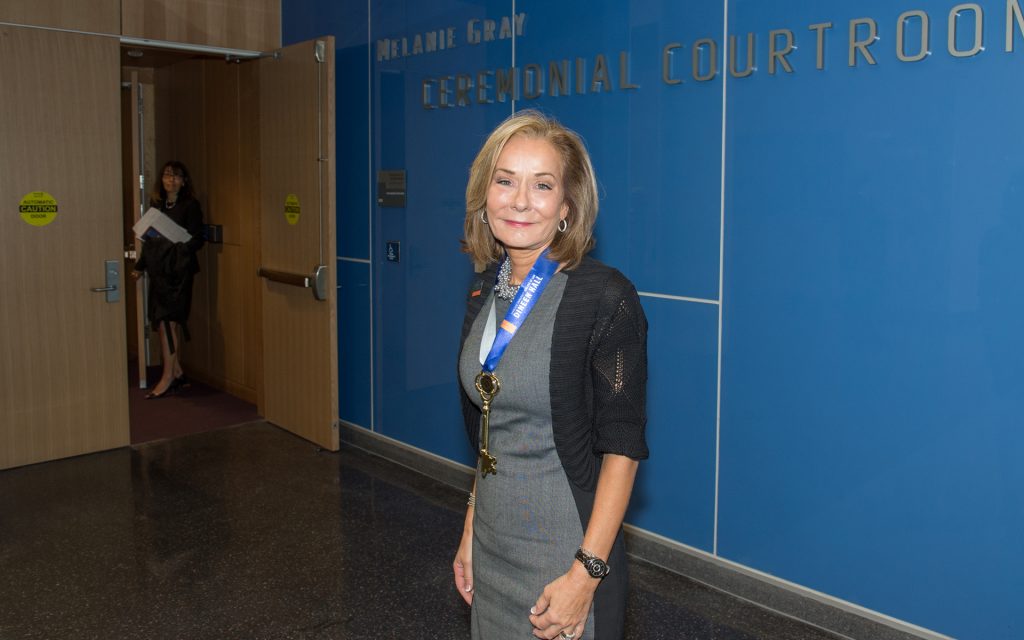
“We knew we needed a visionary leader with innovative ideas and a diversity of life experiences, who was also a team player and bold in vision and action.”
Melanie Gray L’81, College of Law Board of Advisors, University Trustee
Chancellor Kent Syverud, himself an attorney and former law school dean, believed that Boise could turn things around with his bold vision and commitment to academic excellence. When Boise was appointed Dean in 2016, Syverud said “He is the ideal person to lead the College of Law into a new era.”
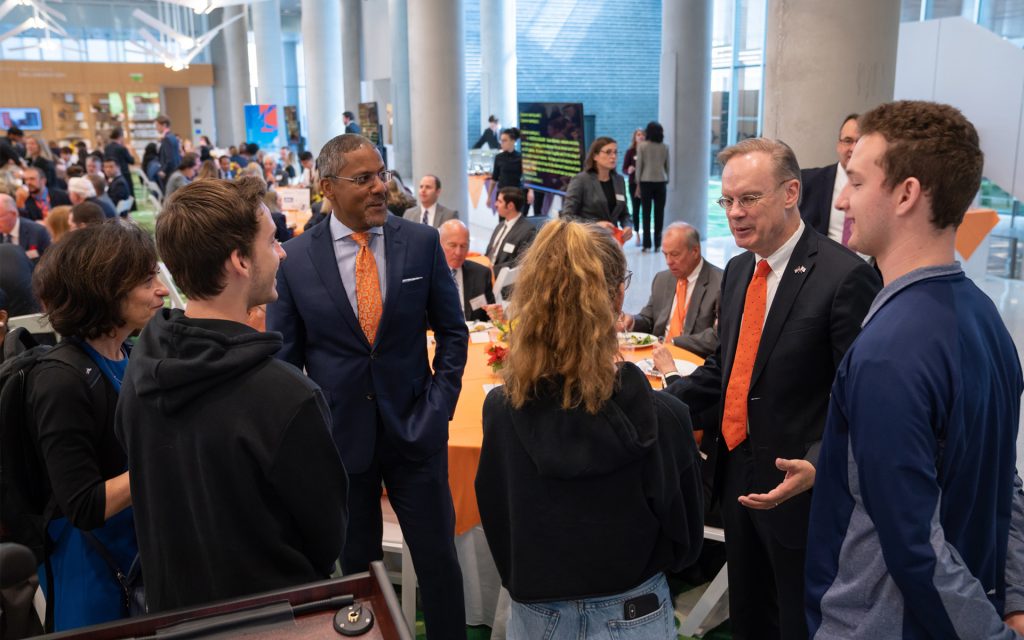
“Dean Boise’s creativity and drive helped the College of Law launch one of the first and one of the best online law degree programs in the nation. He has embraced and advanced priorities of the university, including disability advocacy and advocacy for veterans and military-connected students.”
Chancellor Syverud
“Dean Boise brought innovation to a discipline steeped in tradition,” says Chancellor Syverud. “Dean Boise’s creativity and drive helped the College of Law launch one of the first and one of the best online law degree programs in the nation. He has embraced and advanced priorities of the university, including disability advocacy and advocacy for veterans and military-connected students. I am so grateful to Dean Boise for his outstanding and entrepreneurial leadership over the last eight years and thank him for his distinguished service to Syracuse University.”
Boise says he was drawn to the opportunity because he knew the Chancellor truly appreciated the value of a top-notch legal education and describes Syverud as a mentor. “Still, it was a bit daunting,” he admits. And he had a lot more questions than answers. “How am I going to distinguish myself as a dean? What am I going to bring that is both important and instrumental in moving the institution forward?”
What Boise brought to the College was an incredibly diverse background of life experiences that uniquely qualified him to manage transition and lead through transformation. Raised in a small town in Missouri by Southern Baptist parents, he worked summers on a family farm in Nebraska and, at first, envisioned a career as a farmer or rancher. But his musical talent as a classical pianist earned him a scholarship to a conservatory and a new vision for his future. Then, economic realities set in and Boise left college for the workforce. He worked in a warehouse for a while, as a messenger in a law firm, and enrolled in the police academy. He still sips from his POLICE KCMO mug, a souvenir from his five years as an officer in Kansas City. That’s where he became interested in the law and a different vision for his future and enrolled at University of Chicago Law School. With his J.D. and later an LL.M. in taxation from New York University School of Law, he worked as a corporate lawyer, then switched to academia, eventually becoming dean at Cleveland State University’s law school.
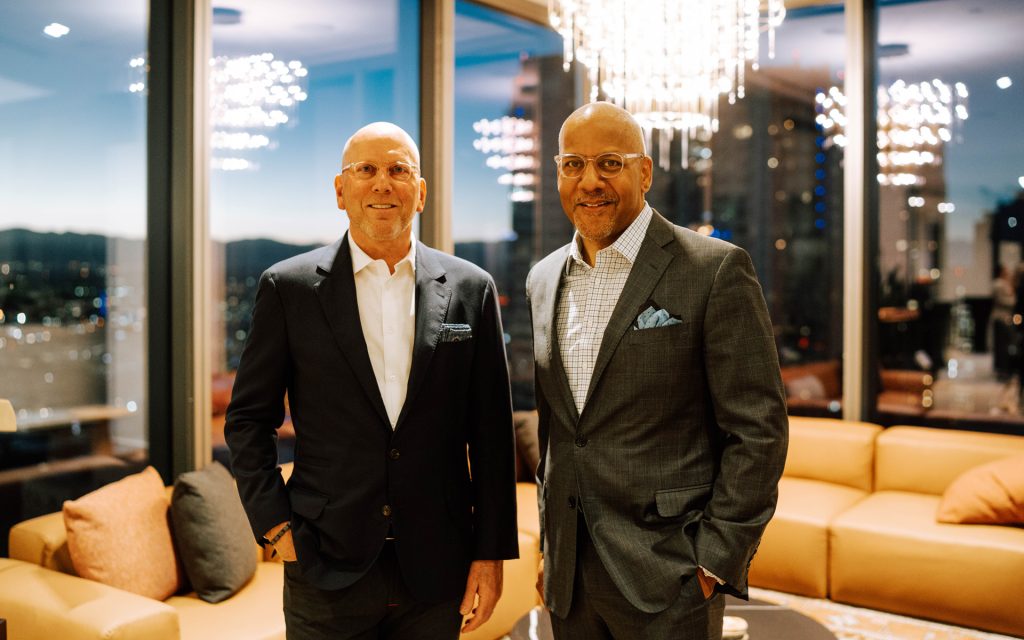
“Perhaps it was the police training, but like a good officer, Craig recognizes points of tension and embraces them. He knows how to deescalate situations and calm things down and bring people along to see his point of view. I’m a big fan and very appreciative of what’s he’s done for the law school and the University.”
Mark Neporent L’82, College of Law Board of Advisors, University Trustee
“There’s a force and energy within his lived experiences that stood out and differentiated him from all other candidates,” say Gray, who was on the Syracuse University search committee that recommended him for the position. Like Gray, Mark Neporent L’82 served on the Board of Advisors and was a University trustee. “Perhaps it was the police training, but like a good officer, Craig recognizes points of tension and embraces them,” says Neporent. “He knows how to deescalate situations and calm things down and bring people along to see his point of view. I’m a big fan and very appreciative of what’s he’s done for the law school and the University.”
In his first year as Dean, Boise launched an assessment of the law school’s assets to better understand what could distinguish it from the other 200+ law schools in the country. Four areas stood out: the Advocacy Program, Disability Law and Policy Program, Innovation Law Center, and the Institute for National Security and Counterterrorism (now known as the Institute for Security Policy and Law). “When we looked at the genesis of these programs, they were big innovations from the start,” says Boise. In fact, these programs provided a foundation for defining and securing the law school’s distinctive brand as an innovative law school. “We have a history of innovation that we could point to, which made it possible to tie the past to where we are going in the future.”
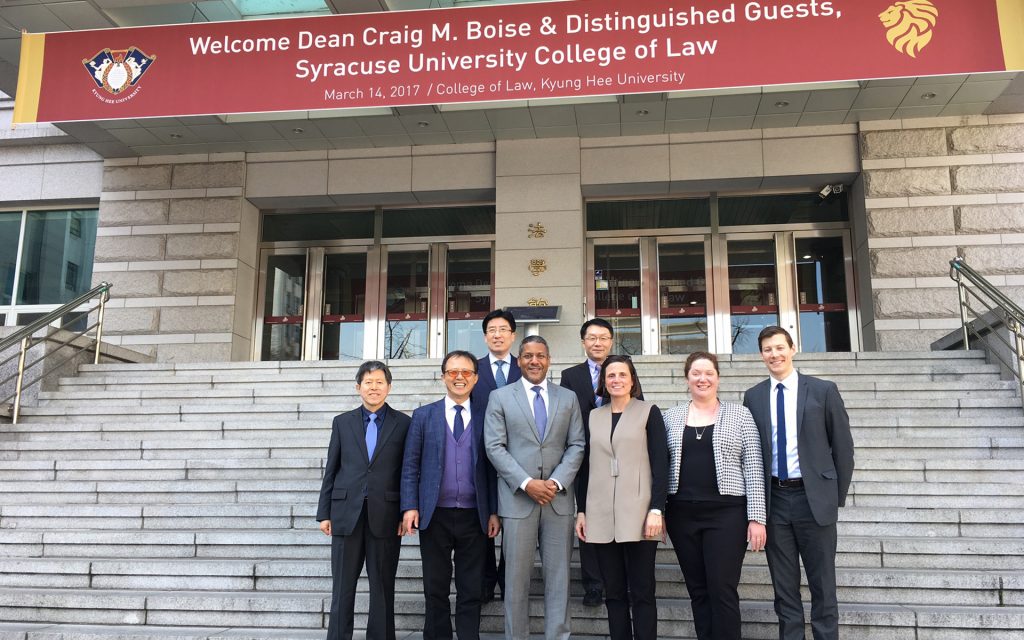
“Craig was steadfast in his determination to build on this history of innovation. To him, that was the brand and brand was mission critical. That meant providing the resources needed to deepen expertise, bringing in new faculty, expanding experiential learning opportunities in each area, engaging alumni, and telling the story of these assets and attributes more effectively to attract new students and drive philanthropic support.”
Sophie Dagenais, Former Assistant Dean for Advancement and External Affairs.
“Craig was steadfast in his determination to build on this history of innovation. To him, that was the brand and brand was mission critical,” says Sophie Dagenais, who served as Boise’s Assistant Dean for Advancement and External Affairs. “That meant providing the resources needed to deepen expertise, bringing in new faculty, expanding experiential learning opportunities in each area, engaging alumni, and telling the story of these assets and attributes more effectively to attract new students and drive philanthropic support.”
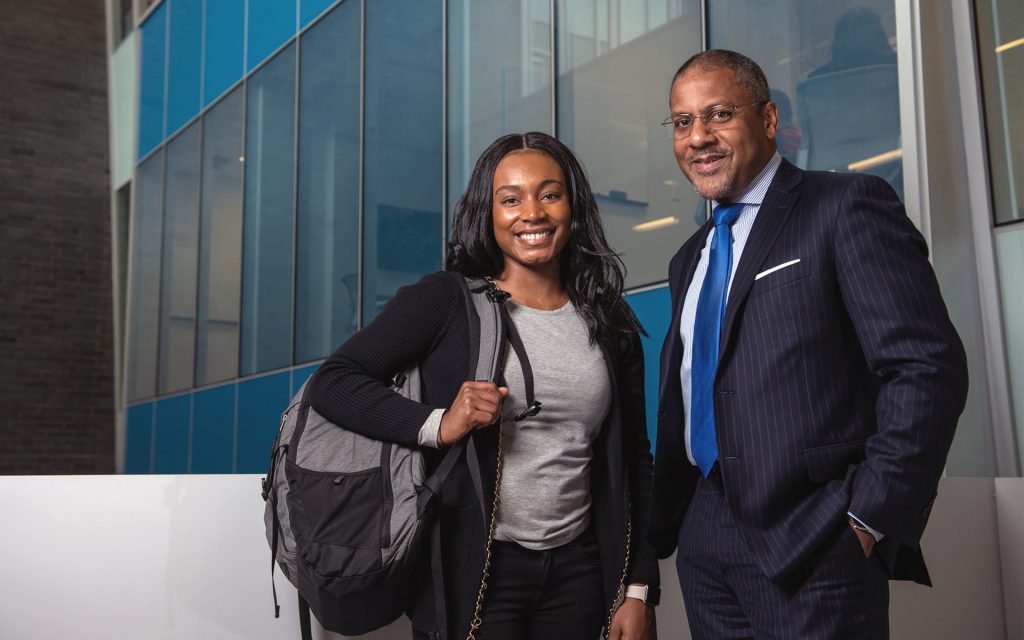
“We have a responsibility to our students to be at the forefront of legal innovation. When we are, we not only better prepare them for the future, but we also shape the future.”
Craig Boise, Dean
“There’s nothing I love better than new ideas and fresh ways of thinking about things, whether it’s curricular—what we are teaching our students—or new ways of teaching or innovation in operations. These things get me excited,” says Boise. “We have a responsibility to our students to be at the forefront of legal innovation. When we are, we not only better prepare them for the future, but we also shape the future.”
Perhaps nowhere is this innovative spirit and impact more apparent than in JDinteractive, the first hybrid online J.D. program of its kind in the nation, combining virtual class sessions with self-paced online instruction, short courses, in-person residencies and a legal externship. The concept of an online program was under development when Boise was hired, but there were questions about its viability. Boise worked closely with faculty to design a program that would get American Bar Association (ABA) support, bring new revenue to the law school, attract and expand a diverse pool of students, and enhance the law school’s reputation. “I was fortunate to work with faculty who were willing to help build the plane while we were flying it,” says Boise.
“It was like a field of dreams. We built it and they came,” says Nina Kohn, David M. Levy L’48 Professor of Law. Kohn who was Associate Dean for Research and Online Education when Boise was appointed dean, admits that she and other faculty members were skeptical at first, because online education was often perceived as low-quality by academicians. “One thing that the launch of a program like this offers is the chance to talk seriously with all constituents—our students, alumni and faculty—about who we are as a college of law and why what we do matters. Our goal was to offer the best possible legal education that meets the needs of the profession. We created a space for those individuals for whom the residential program was not an option: people who have jobs and are not living near excellent night programs; people who have caregiving responsibilities; people who are in the military and don’t live in one place for very long. The people we built this for are now our graduates, and many of them serve in communities that are historically underserved. So we are not only helping students get the legal education they dreamed of, we’re helping communities as well.”
“When Craig came on board, it was his passion that helped push the program forward,” says Shannon Gardner, Teaching Professor and Associate Dean for Online Education. “He’s leading for the future, committed to innovation and 22nd century lawyering.” Gardner teaches the first five-day on-campus residency course for the JDi students. “I just fell in love with the students. Most have wanted to go to law school for so long, but thought it was an unattainable dream. They have so much gratitude and it’s gratifying for us to see them be able to join the legal profession.”
“When Craig came on board, it was his passion that helped push the [JDinteractive] program forward. He’s leading for the future, committed to innovation and 22nd century lawyering.”
Shannon Gardner, Teaching Professor and Associate Dean for Online Education
“I went to Zoom school before it was cool,” says Tiffany Love ’22, who was in the first cohort of JDi students. A military spouse, she had put her law school dreams on hold. But while stationed in Germany, she was accepted into the JDi program. “I was literally in class from midnight to 4 am, and then worked full time as a paralegal for the Army JAG.” Though she was concerned at first about how her credentials would be perceived by potential employers, she says the quality of a Syracuse law degree was an asset, no matter how it was attained. Now, Love is a second year associate at Phelps Dunbar LLP in Tampa.
“The JDi program single-handedly changed the trajectory of my life; it made a law degree accessible with the reputation of a national security powerhouse. Along with other College of Law visionaries, Dean Boise created this future for me. I know my legal contributions made a difference. I am forever grateful.”
Meghan Steenburgh G’97, L’23, Assistant General Counsel with the Department of Defense
Meghan Steenburgh G’97, L’23 is also living her dream, thanks to JDi. Now Assistant General Counsel with the Department of Defense, she said the program allowed her to pursue a law degree while caring for her children and helping her parents while living in three different states. “The JDi program single-handedly changed the trajectory of my life; it made a law degree accessible with the reputation of a national security powerhouse,” says Steenburgh. “Along with other College of Law visionaries, Dean Boise created this future for me. I know my legal contributions made a difference. I am forever grateful.”
The popularity and success of JDi also changed the fiscal trajectory of the law school. Further, concerns about quality are a thing of the past, with increased LSAT scores among applicants and impressive bar passage rates. JDi’s success has had ripple effects throughout the university, with the creation of the nation’s only online joint J.D./MBA program, a significant expansion of the Center for Online and Digital Learning to provide support for other degree programs, and, the inclusion of JDi students in other stellar programs like Advocacy and Syracuse Law Review. For example, JDi students are included in virtual trial competitions, preparing students for more virtual practice in the real world. “They have a leg up,” says Jefferies, noting that she recently had three court cases in which she appeared virtually. She now coaches JDi students for virtual advocacy competitions.
A pilot program with JDi students will contribute to a significant expansion in enrollment in the ILC, says Gerling. Gerling also credits Boise with bringing the University’s tech transfer office into the ILC, giving law students the chance to do real-world work on commercializing new technology generated by researchers across the campus. “That’s a real feather in Craig’s cap,” says Gerling. “His vision and leadership led to a productive working relationship between the Office of Research and the law school. We’ve also developed internships with the Office of the General Counsel. Our students not only learn how to think like lawyers but practice the skills necessary for the practice of law.”
And it was Boise’s outreach to alumni that made it possible for students to develop so many new skills. “Craig engaged alumni in unique ways,” says Dagenais. “Our alumni stepped up and delivered content for JDi residencies, teaching short courses for a weekend or several days and enabling our students to do a deep dive into specialized sectors of the law.”
Boise’s ability to articulate the vision engaged alumni in ways that will benefit the law school for years to come. “He’s an impressive guy,” says Frank Ryan L’94, DLA Piper’s Global Co- Chair, Global Co-CEO and Americas Chair. Ryan rejoined the Board of Advisors in 2017 after Boise met with him in New York City and persuaded him to get re-engaged with his alma mater. “Craig’s ideas on how to transform legal education connected with me. He read the tea leaves and offered an understanding of how to compete against other law schools and how we as alumni could help.”
Now, Syracuse Law has the highest rate of alumni engagement of all twelve University schools and colleges, along with the highest alumni giving participation, exceeding its goals for the Forever Orange Campaign a year ahead of schedule. Ryan calls Boise an “exceptional team builder. He empowers people and then lets them go and do their jobs.”
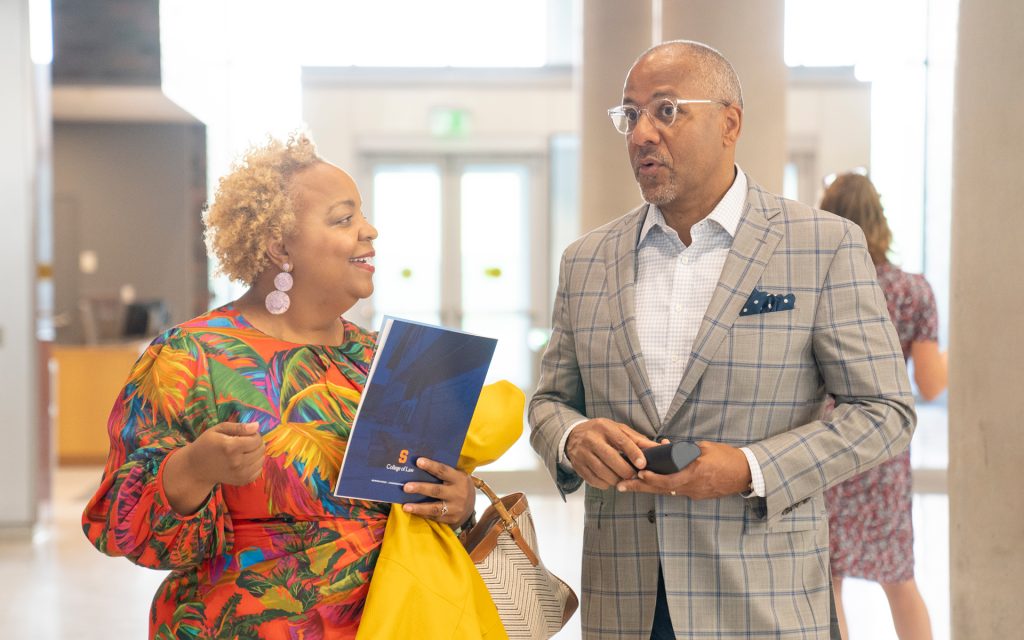
“Craig just has a way about him. He was willing to hear the hard stuff and discuss the pain points shared by Black alumni from the 1990s like myself. He created space for diversity that did not alienate the traditions that were so important to the institution.”
Benita Miller L’96, Vice President of U.S. Programs for the Center for Reproductive Rights
Benita Miller L’96 credits Boise’s for engaging alumni in meaningful ways by “creating space for everyone at the table.” Now Vice President of U.S. Programs for the Center for Reproductive Rights, Miller says she had not felt “at home” at the law school until Boise reached out, painted the vision, listened to her concerns and ignited her passion to serve the students. Today, she is on the Board of Advisors and mentors JDi students. “Craig just has a way about him. He was willing to hear the hard stuff and discuss the pain points shared by Black alumni from the 1990s like myself. He created space for diversity that did not alienate the traditions that were so important to the institution.” Miller cites JDi and the Orange Advance pipeline program with HBCU institutions as innovations that “are really important to our profession. We’re contributing to a more expansive legal community.”
“Craig focused the value proposition of law school on opening the aperture for our students to have more career opportunities and reach life goals,” says Lily Yan Hughes, Assistant Dean of Career Services and Student Experience. Having had a prolific career in corporate law, Hughes was intrigued when Boise approached her in 2021 to help him reimagine career services. “My team’s ‘tagline’ is that we are not just resume readers or a job bank. We are here to help students think more strategically and to be CEO of their own careers.”
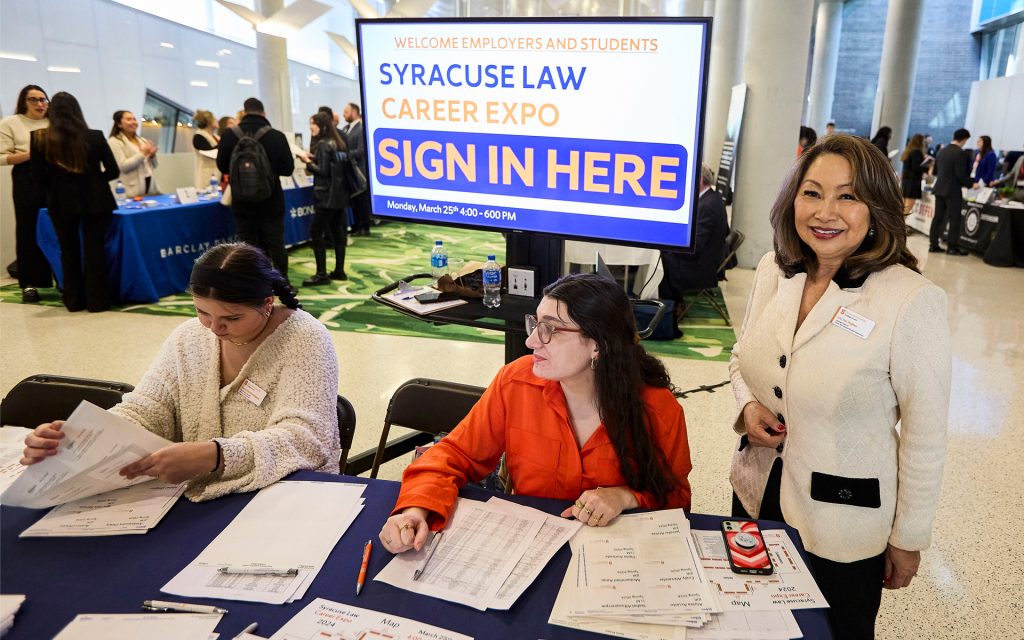
“Craig focused the value proposition of law school on opening the aperture for our students to have more career opportunities and reach life goals.”
Lily Yan Hughes, Assistant Dean of Career Services and Student Experience
Evidence of the value proposition at work: The last four years have seen a 55% increase in overall student externship placements. Last year, 195 students were placed in externships in 29 states, many of them made possible because of the Orange alumni network. The rate of employment ten months after graduation jumped 21% from 2018 to 2023.
As graduates fan out into careers in the courtroom or the boardroom, in public service or private equity, and use their degrees to practice law or bring a different way of thinking to other industries, they are the living legacy of the tenure of a dean dedicated to innovation and bringing a new value proposition to their education.
The Board of Advisors recognized that legacy in creating a new scholarship in his name, to be awarded to a student who has demonstrated an entrepreneurial and innovative spirit. With emotion in his voice as the scholarship plaque was presented to him, Boise expressed his gratitude. “This was such a perfect gift because it reflects what I value most—opportunities for our students to pursue meaningful careers in a world that requires their vision, integrity and a steadfast commitment to justice.”
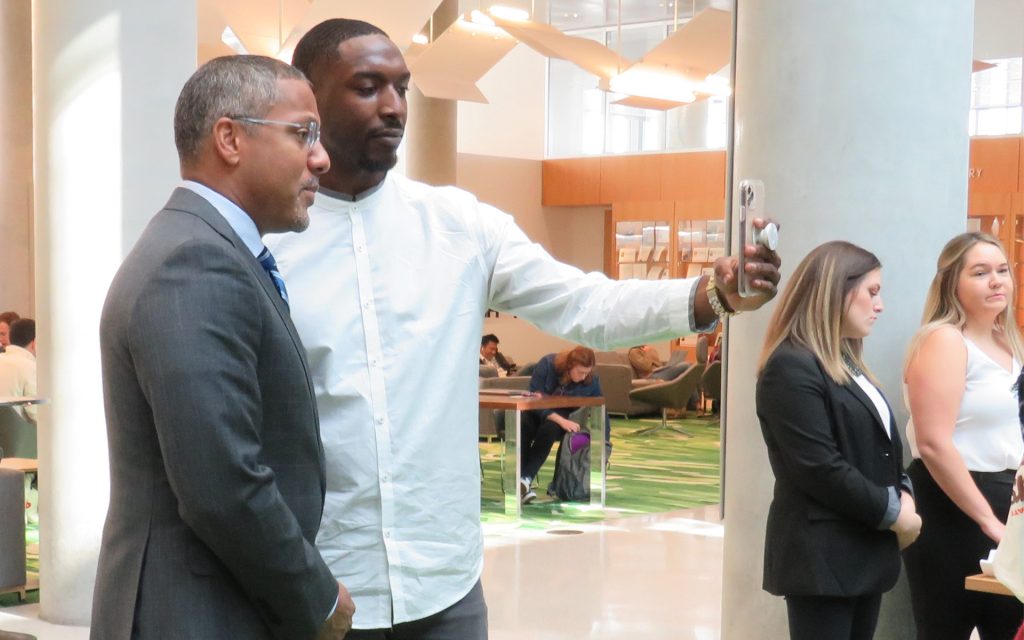
As Boise prepares to take his first sabbatical in 21 years, he’s looking forward to contributing to further innovations in legal education. He plans to teach a JDi course and work with the Center for Online Design and Learning to integrate new technologies into course design. But first, he says, he’ll focus on other passions. He’ll play more piano, especially the works of Rachmaninoff and Chopin who were both considered innovators in their time. He also plans to set sail, steering a boat through whatever turbulence he might encounter to find peace and calm in the expanse of the seas.
